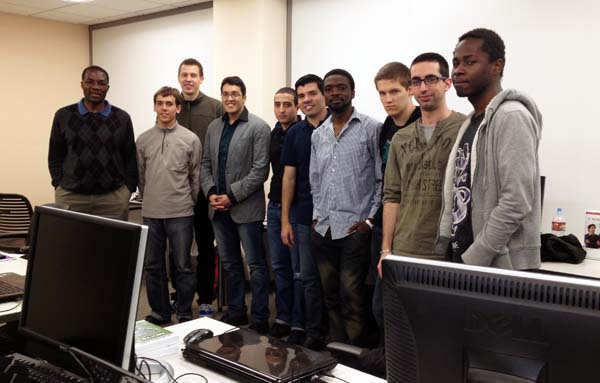
In Christophe Bobda’s computer engineering lab, the students communicate in English, with a generous dose of computer jargon mixed in. They share a passion for the complicated hardware and programming that is an essential part of high tech devices. But they have as many differences as they have things in common. Bobda, associate professor of computer science and computer engineering, draws student from across the globe to take part in his research. His current graduate students have traveled from Cameroon, France, Germany, Mexico and Morocco to study with him.
“The United States is the place to be when it comes to science research,” explained Franck Yonga, a doctoral student from Cameroon who has also studied in Germany. “In Europe, they are paying attention to what's going on here. Things here move fast, which is good.”
Yonga is working on smart embedded camera systems, looking at the most efficient ways to develop systems of coordinated security cameras that can perform computing and exchange information. Bobda explained that attracting students like Yonga benefits the university and its students. “Exposure of our students to students from other countries increases our visibility and cooperation with other countries,” he said.
Kevin Labille, a master’s student from France, is working on autonomous navigation systems for unmanned aerial vehicles, which could act as an extra level of control and safety. His system is based on image processing, using photos to detect obstacles and measure distances. Labille explained that during his time at the U of A, he has learned a lot about image processing, a field that was new to him, and he has also learned a lot about the different cultures of his classmates.
“We have people speaking German, Arabic, French, Spanish,” he explained. “Sharing our experience and working together is very important.”
Martin Malchow, a master’s student from Germany, is working on a new kind of remote controlled car, while Adil Tbatou, a master’s student from France, is developing a system to detect and prevent malicious software that creates armies of virus-infected computers called botnets. A student from Morocco named Anas El Hallabi is looking at ways to improve data communications in image sensors, and Mexican student Jesus Lizarraga is studying distributed networks that can more easily save records and protect computer operations. Bobda’s lab team also includes Florian Alard, Guillame Darnis and Mickael Niglis, all master’s students from France, and Michael Mefenza, a doctoral student from Cameroon.
Bobda explained that he uses many different resources to make international contacts and attract students from different countries. He has developed contacts at conferences and by serving on committees, and he doesn’t hesitate to reach out to colleagues over email. His hard work pays off when he is able to attract top quality graduate students from around the world to the University of Arkansas. “They're very smart students,” he said of his current group. “You give them something to do, they've already solved the problem.”
Contacts
Camilla Medders, director of communications
College of Engineering
479-575-5697,